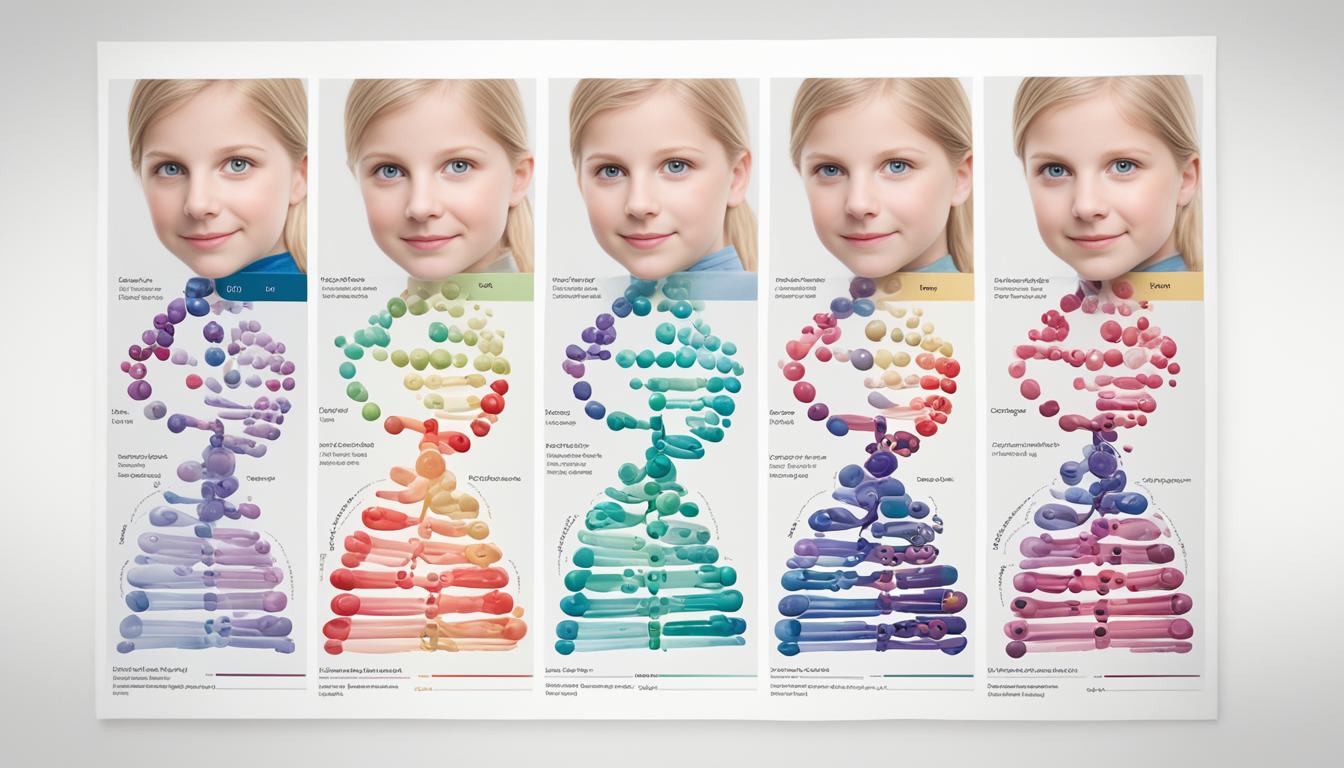Klinefelter syndrome is a genetic condition in biological males. They are born with an extra X chromosome. This extra chromosome can cause numerous symptoms and challenges.
Common signs of Klinefelter syndrome are small testicles and low testosterone. This leads to breast growth, a smaller penis, and less beard and body hair. People might also experience delayed speech and language skills, and they could have trouble with reading and paying attention.
Many face difficulties with their energy levels and starting puberty late. They might grow taller than usual, find it hard to build muscle, and have smaller testicles. The level of symptoms varies among individuals.
About 1 in 500 to 1 in 1,000 newborn males have Klinefelter syndrome. The extra X chromosome can be from the mother’s or father’s genetic material. It usually happens randomly at conception.
People with Klinefelter syndrome are more likely to suffer from osteoporosis. They are also at higher risk for heart issues, diabetes, autoimmune conditions, and some cancers.
Key Takeaways:
- Klinefelter syndrome is a genetic condition with an extra X affecting males.
- Notable symptoms are small testicles, low testosterone, and breast growth.
- It impacts between 1 in 500 and 1 in 1,000 newborn males.
- Diagnosis typically involves chromosomal testing.
- Treatment includes hormone therapy, speech and physical therapy, and fertility help.
Management and Treatment of Klinefelter Syndrome
The treatment for Klinefelter syndrome depends on how severe the symptoms are. If the symptoms are mild, treatment might not be needed. But, for those with more severe symptoms, early help is best. One common treatment is testosterone replacement therapy. This can help puberty start, leading to a deeper voice, more hair, stronger muscles, and healthier bones. Testosterone is given in different ways, like through pills, patches, creams, or shots.
Speech and language therapy is key for those with Klinefelter syndrome. It helps with speech and language delays. This therapy works on talking better, learning more words, and making friends.
Physical therapy helps make muscles stronger, improve movement, and make everyday actions easier. It can boost the quality of life for those with Klinefelter syndrome.
Occupational therapy aids in improving life skills. It focuses on helping with things like getting dressed, eating, and personal care, making daily life better.
Behavioral therapy is very important. It helps with social skills and how to behave in different situations. This can make social situations more comfortable and boost self-confidence for those with Klinefelter syndrome.
Special educational help is crucial for those with Klinefelter syndrome. It includes extra school help and support to learn better. These programs help students do well in school by addressing their unique needs.
Counseling is vital for managing Klinefelter syndrome. It offers support and helps deal with the condition’s challenges. It also tackles any mental health issues that might come up.
Some people with Klinefelter syndrome may choose to have a mastectomy surgery if they have too much breast tissue. This can make them more comfortable with their bodies.
For those wishing to have kids, fertility treatments are an option. Procedures like injecting sperm directly or extracting sperm from the testicles can help with fertility challenges.
Management and Treatment Options for Klinefelter Syndrome
| Treatment Options | Description |
|---|---|
| Testosterone replacement therapy | Administering testosterone to trigger puberty development and enhance male characteristics. |
| Speech and language therapy | Addressing speech and language delays through targeted therapeutic interventions. |
| Physical therapy | Improving muscle strength, coordination, and mobility through tailored exercises and interventions. |
| Occupational therapy | Enhancing daily functioning and independence through specialized interventions and skills training. |
| Behavioral therapy | Improving social skills and managing behavior patterns through targeted therapeutic strategies. |
| Educational assistance | Providing specialized support and accommodations to address learning difficulties associated with Klinefelter syndrome. |
| Counseling | Offering emotional support and addressing psychological and mental health concerns. |
| Mastectomy surgery | Removal of excess breast tissue through surgical intervention. |
| Fertility treatments | Assisting with reproductive options through procedures such as intracytoplasmic sperm injection or sperm extraction. |
Research and Advances in Klinefelter Syndrome
Researchers are making important strides in tackling Klinefelter syndrome. A key area of focus is stem cell therapy. Using spermatogonial stem cells holds promise for those with the syndrome to possibly regain fertility. This approach has already led to successful sperm production in animal studies.
These breakthroughs could lead to real treatments in the future. One possibility is freezing and storing testicular tissue. This stores stem cells for later use. There’s even work on growing these cells outside the body, which could be another option for preserving fertility.
In addition, scientists are looking at ways to make the stem cell therapy even more effective. They’re studying genetic changes that might help the cells work better. Experiments on XXY mice have revealed important information on the syndrome, which might lead to new treatments. These findings offer a glimmer of hope for people with Klinefelter syndrome, aiming for better lives and outcomes.

